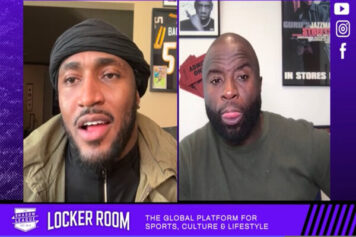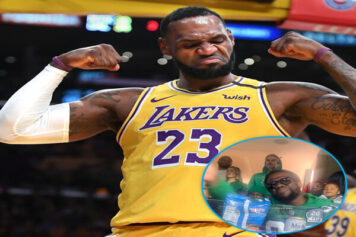From Antoine Fuqua, LeBron James and Maverick Carter, this doc tells Ali’s story in a new way.
It seemed like a million years ago when LeBron James once told a Sports Illustrated reporter that he aspired to have a similar impact on the world as Muhammad Ali. Since that time, James has taken his own path to glory, and that now includes producing a well-made and visually pleasing Ali documentary produced by Maverick Carter and LeBron himself.
The two-part documentary premiered in its entirety at the Tribeca Film Festival this week and will air on HBO on May 14. The direction provided by Antoine Fuqua is as sincere and heartfelt a portrait as can be made of a man who was a symbol of hope for oppressed people across the globe.
“Muhammad Ali transcended sports in a way the world had never seen before,” says executive producer LeBron James. “It’s an honor to have the opportunity to tell his incredible and important story for the coming generations. He showed us all the courage and conviction it takes to stand up for what you believe in. He changed forever what we expect a champion to be, and I’m grateful that Spring Hill gets to be a part of continuing his legacy.”
The job of a documentarian is to breath new life into the subject matter, which is indeed a grand undertaking when it is to pay homage to the great Muhammad Ali.
The Origin of the Title
The fight he had with Ernie Terrell is one of the most spoken about jewels in his dazzling crown of legendary feats. Terrell, briefly a champion himself in the 60s, was pummeled and taunted by Ali in the ring because he refused to call him by his newly chosen Muslim name.
Terrell would claim the vacant WBA heavyweight crown in March 1965 after a unanimous decision over Eddie Machen. The World Boxing Association took the title from Ali over a rematch with Liston.
Former heavyweight great Floyd Patterson, who also refused to say Ali’s name, was beaten mercilessly by the Champ in 1965 after he refused to say his Muslim name.
Terrell would suffer a similar beating in 1967 that was compounded by the indignity of being taunted by the man formerly known as the Louisville Lip. “What’s my name?” Ali reportedly said, raining shots upon a hapless Terrell, “What’s my name?”
Though there are around a dozen documentaries about the Greatest Heavyweight Champion of All-Time, but director Antoine Fuqua breathed life into the old black and white film, with rare shots of Ali in his handsome youth, relaxed with family.
Most of the story of What’s My Name is told in the words of Ali himself. For boxing fans and historians alike, his name change from Cassius Clay to Muhammad Ali is well known.
However, at the time, this was seen as controversial if not downright revolutionary.
His allegiance to the Nation of Islam and Elijah Muhammad, who mentored him, and Malcolm X, who he was dear friends with at one time.
The Flow of the Narrative
Antoine Fuqua is masterful with the manner in which he inserts just the right amount of information at the very moment a question may arise in the mind of the viewer. In this instance, a glimpse of a government file showing the government spied on the NOI, declaring it a “dangerous group”.
1967 was a tumultuous year of war, civil rights protests, riots, and death. We revisit the draft evasion charge, his boxing excommunication and his historical lyrical wrestling matches with legendary sports broadcaster Howard Cosell are but a few of the many memory landscapes that Antoine brings to life with a collage of images.
If it’s Antoine Fuqua, it’s going to be soulful, and that’s true of the visual and audio aesthetic of the documentary.
Fuqua’s storytelling is slick and smooth like ice, never dwelling too long in one subject, always moving and alive. Images of meetings with grand dignitaries like Mandela, conversations about Ali’s later years as his skills and health deteriorated. Fuqua’s lens doesn’t blink in showing us the sad shadow of the boxer he once was.
We see much more second-hand testimony or old video of a clever line or two, of which Ali seemed to have a million.
Charged with draft evasion, Ali was stripped of his title and lost three years of his career.
Fuqua is certain to highlight how Ali’s relationship with Cosell was instrumental in helping craft a favorable image with mainstream America after the end of his exile. They were damn near like a vaudeville comedy team at times.
Howard Cosell shouts that Ali is “a faded hero of yesteryear,” and Ali claps back, “Howard, every time you open your mouth you should be arrested for air pollution.”
As the film progresses toward the years when his Parkinson’s disease greatly reduced his speech and mobility, we see less and less footage of Muhammad himself.
Thankfully, Fuqua didn’t shy away from the incendiary side of Ali nor his willingness to speak truth to power and say everything with his chest decades before the phrase was coined.



